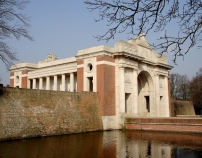| First Name: | Francis Thomas | Last Name: | DERRY | |
|---|---|---|---|---|
| Date of Death: | 16/06/1915 | Lived/Born In: | Stamford Hill | |
| Rank: | Lance Corporal | Unit: | Honourable Artillery Company1 | |
| Memorial Site: | Menin Gate, Ypres | |||
Current Information:Age-32 106, Osbaldeston Road, Stamford Hill
Attack at Bellewaarde 16th June, 1915 This attack was carried out with the objectives of capturing the Bellewaarde Ridge, in the northern part of the Ypres salient thereby depriving the enemy of a valuable vantage point and straightening out the line between Hooge and Railway Wood where the width of no-man’s-land here varied from 50 yards in the centre to 200 yards on the flanks. It was a very well prepared action. Telephone lines were laid in triplicate and in case they failed the pigeon service was brought into action. The German wire was dealt with by high explosive shells and proved not to be a hindrance. Jumping off trenches were dug and there was no real attempt to conceal the place of the attack. The element of surprise would be in the timing. The attack was to be made by 9 Brigade and 7 Brigade, both of 3rd Division, in three waves, each successive one pushing further into German territory until Bellewaarde Ridge itself was taken. 9 Brigade provided the first wave of the attack with 4th Royal Fusiliers, 1st Royal Scots Fusiliers and 1st Northumberland Fusiliers leading. 1st Wiltshire from 7 Brigade covered their right flank The bombardment of the German positions began at 2.30am and at 4.15am the first infantry wave went in. The element of surprise worked and the German front line was taken with little resistance. The second wave, 1st Lincolnshire, 7 Brigade and 10th Liverpool (Kings), 9 Brigade, now joined the attack but at the same time and prematurely, the third wave, consisting of the 1st Honourable Artillery Company and 2nd Royal Irish Rifles, both of 7 Brigade, rose from their assembly trenches to join the attack. This resulted in confusion and overcrowded trenches and caused the whole advance to proceed too quickly. The unfortunate effect of this was that they ran into their own barrage before it lifted, mist and smoke preventing the British gunners from observing what was happening. Not surprisingly this disorganised the attack, which was now swept by accurate hostile fire from three sides, and it degenerated into confused fighting with bombs and bayonets. Nevertheless the second German line was taken and some even made it to the third enemy line. A German counter attack at 7.30am was repelled but two hours later ammunition and bombs were running out and the shells were falling thick and fast so there was a general withdrawal back to the first line captured with a few units hanging on in more forward positions until later in the day. Another attack was ordered for 3.30pm and 42 Brigade of 14th Division began moving up to support this. But they arrived too late and only two battalions managed to attack and neither achieved anything except more death and injury. At 6pm the decision was taken to consolidate the initial gains that had been made, namely the German front line for half a mile between the Menin road and Railway Wood, and the area of No Man’s Land behind but the enemy remained in possession of Bellewaarde ridge and the observation posts on it. 8 Brigade took over the line and 7,9 and 42 Brigades were withdrawn to rest. 3rd Division casualties amounted to over 3,500 almost all of which were the result of artillery fire, including ‘friendly fire’. German losses were less than 500. One of those killed was Francis Derry of the 1st Honourable Artillery Company. |
||||
| « Back to Search Results | ||||
| If you think any of the information shown here is incorrect, Click Here to submit your amends and comments | ||||




